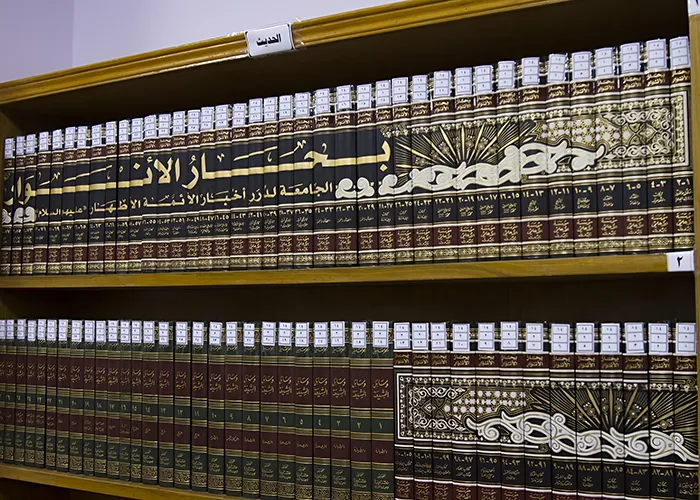Ayah Of The Week – Volume02 Issue01
“True Knowledge and Its Divine Purpose: Lessons from Surah Fatir for All Generations”
Introduction
In the week where we commemorate prominent scholars and thinkers such as Imam Muhammad Baqir (A.S), Imam Hadi (A.S), Abu Rayhan Biruni, and Sheikh Shihab al-Din Suhrawardi, it is an opportune moment to reflect on the true essence of knowledge and its significance in Islam. These revered figures exemplified the pursuit of knowledge not just as an intellectual endeavour, but as a means to attain divine closeness and fulfil the greater purpose of life: the worship and fear of Allah SWT. One verse that encapsulates the profound relationship between knowledge and piety is found in Surah Fatir, verse 28:
إِنَّمَا يَخْشَى اللَّهَ مِنْ عِبَادِهِ الْعُلَمَاءُ
“Indeed, it is only those who have knowledge among His servants who fear Allah.”
(Surah Fatir, 35:28)
This verse sheds light on the responsibility and privilege of those who possess true knowledge and how it leads to greater reverence for Allah SWT.
In this article, we will explore the deeper meanings of this verse, “Innamā Yakhshā Allah Min ʿIbādihī Al-ʿUlamāʾ” and reflect on the educational messages it imparts for different groups within society: youth, parents, and religious scholars.
Educational Messages of the Verse for Teens and Youth:
1. Pursuit of Knowledge as a Virtue
In a world where entertainment and enjoyment often takes precedence over education for teens and youth, this verse is a reminder of the higher value of knowledge. Imam Baqir (A.S) and other great scholars mentioned earlier lived their lives in pursuit of knowledge, not just as a means to gain material success but as a way to gain closeness to Allah. For teens and young people, the verse teaches that the acquisition of knowledge is not just an academic pursuit but a moral and spiritual virtue that sets you apart from the crowd. In a society where many focus on fun and leisure, pursuing knowledge can be a defining characteristic of your personality and future.
2. Knowledge as a Means, Not an End
It is important to note that knowledge itself is not the ultimate goal. This verse reminds us that the true purpose of knowledge is to bring us closer to Allah and to cultivate Taqwa (God-consciousness) in our lives. Young people should understand that gaining knowledge should not be an end in itself but a means to fulfil the higher purpose of worshipping Allah SWT and seeking His pleasure. The true scholar is not one who merely accumulates facts, but one who uses that knowledge to increase in piety and reverence for Allah.
Educational Messages of the Verse for Parents:
1. Support Your Children in Their Pursuit of Knowledge
As parents, it is crucial to guide and support your children in their academic and intellectual pursuits. This verse encourages us to help our children understand the value of knowledge, not just for worldly success but as a means of growing closer to Allah SWT. Set academic goals together and help them understand that knowledge should always be pursued with the intention of benefiting society and serving God.
2. Avoid Viewing Knowledge and Entering University as the Ultimate Goal
While academic success and university education are important, parents must remember that the ultimate goal is not just degrees or certificates, but Taqwa (God-consciousness). The verse implies that true knowledge should enhance our ability to worship and obey Allah. Parents should be cautious not to prioritize worldly achievements over spiritual growth. A scholar who leads their life away from the path of Allah, even with vast knowledge, is misguided. Encourage your children to seek knowledge that brings them closer to Allah.
3. Becoming Acquainted with the Signs of Allah’s Power Through Knowledge
Parents should teach their children that as they learn new sciences, they are actually becoming acquainted with new signs and manifestations of Allah’s power. Just as we cannot see electricity, but we recognise its presence through the light from a lamp or the operation of electrical devices, in a similar way, through knowledge, we are introduced to the signs of Allah’s greatness and power. The more we learn, the more we come to understand the marvels of the world – from the smallest living organisms to the vastness of the universe – all of which point to the might and majesty of Allah SWT. Parents should help their children realise that acquiring knowledge not only broadens their understanding of the world but also brings them closer to recognising the existence and greatness of Allah. Knowledge, therefore, should not only expand one’s understanding of the world around them, but also deepen one’s awareness of the Creator of that world.
4. Beware of Arrogance in Knowledge
Parents should teach their children that knowledge must be accompanied by humility. The verse highlights that the true scholar is one who fears Allah SWT. Knowledge should not make us proud or arrogant, as this would take us away from the worship of Allah. It is important to emphasise to children that arrogance and pride are contrary to the spirit of learning and that a scholar’s true worth lies in their humility and devotion to God.
5.Teach the Balance Between Knowledge and Action
It is also important for parents to remind their children that knowledge is not only for theoretical understanding but should translate into action. True knowledge leads to good deeds and righteous behaviour. A person who truly understands the teachings of Islam will act upon them, showing kindness, justice, and humility in their daily lives. Encourage your children to practice what they learn and to live according to the principles they study. That is why the Honourable Prophet of Islam, in his supplications, sought refuge in Allah from useless knowledge, saying:
اللهمّ إنّى أعوذ بك من علم لا ينفع
“O Allah, I seek refuge in You from knowledge that does not benefit.”
Educational Messages of the Verse for Religious Scholars and Imams:
1. Define True Knowledge as Knowledge that Brings Us Closer to Allah
Imams and scholars have a responsibility to educate the community on the difference between mere accumulation of facts and true knowledge. The verse from Surah Fatir teaches that true knowledge is that which leads to a greater fear and reverence for Allah. Knowledge that merely fills our minds with facts without affecting our hearts is not the kind of knowledge that Allah desires. Scholars must guide their audiences to seek knowledge that nurtures their spirituality and increases their devotion to God.
2. True Scholars Are Those Who Attain God-Consciousness
While many people engage in religious practices, it is only those who possess true knowledge who truly fear Allah. This is an important distinction for religious leaders to make. The pursuit of knowledge must go hand in hand with piety. Scholars and imams should lead by example, demonstrating that knowledge is not just for academic achievement, but for the enhancement of one’s relationship with Allah.
editor's pick
news via inbox
Subscribe to the newsletter.




